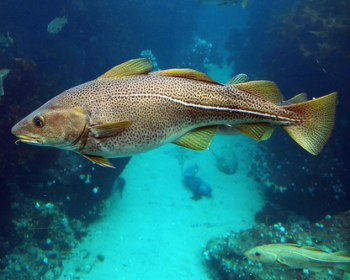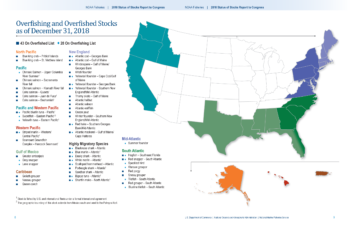Earlier this month, NOAA released its 2018 Report to Congress on the Status of U.S. Fisheries, the agency’s annual requirement to update lawmakers on how our nation’s federal fisheries are faring. For all of us, it’s an opportunity to assess how successfully these crucial marine resources are being managed and what, if any, tweaks need to be made to the law and regulations that govern them.
For the most part the report shares good news. Most notably, the number of stocks that have been rebuilt continues to rise incrementally from year to year. For example, Gulf of Maine smooth skate, has been undergoing a nine-year rebuilding effort, and was finally considered recovered last year. Also on the positive news front, the percentage of stocks that are overfished (18%) or experiencing overfishing (9%) remains relatively low.
The report also reveals, however, that there’s room for improvement. Most notably, the number of stocks on the overfished list increased by eight from last year. NOAA added Pacific Northwest king (chinook) and silver (coho) salmon to the overfished list, in part due to low river levels and warming waters. Atlantic bigeye tuna has also landed on the list, as well as Atlantic mackerel, which has been assessed for the first time.
In a recent article on TalkingFish.org, Peter Shelley, senior counsel at Conservation Law Foundation and member of the Network Policy Council, points out that the New England Fishery Management Council manages a large number of the overfished stocks on the list, and some of these stocks, such as Atlantic cod, have been overfished for decades. He also takes to task the National Marine Fisheries Service (NMFS), which is directly responsible (not through one of the regional fishery management councils) for the U.S. management of highly migratory species, such as tuna, marlin and sharks, that have catch limits set through international agreements. He states, “Of the overfished stocks that are still subject to overfishing, New England Council- and NMFS-managed stocks comprise 82% of the total.” Bluefin tuna (Pacific/Western Pacific) and striped marlin (Western Pacific), plus two stocks in the South Atlantic, are also overfished and still subject to overfishing.
The remedy to rebuild overfished stocks, says Shelley, is strict management, which “has been found over and over to lead directly to stock rebuilding, stock health, increased revenues, and increased jobs.”
The Marine Fish Conservation Network couldn’t agree more.
As I’ve written about before, the importance of NOAA’s annual report lies less in the up or down fluctuations from year-to-year but more in the general trends of NOAA Fisheries’ management success. Overall improvements to the management of our fisheries began once Congress changed the primary focus of the Magnuson-Stevens Fishery Conservation and Management Act to conserving fish stocks at a minimum sustainable level for present and future benefit. We have seen even greater management gains since Congress amended the law in 2006 to ensure that all catch limits are based in best available science and fishery managers and fishermen are held accountable if they exceed these limits.
In other words, we successfully manage our fisheries when we adhere to the Magnuson-Stevens Act’s guiding principle that all management decisions should be based in what’s best for the long-term abundance of these marine resources, which in turn supports the economic wellbeing of everyone who depends on them.
When we steer away from this principle we see fish stocks such as Atlantic cod that stay on the overfished list for decades. Or when we fail to curb our take of salmon despite changing, uncontrollable environmental conditions, we see a new stock added to the overfished list. The Status of Stocks report is a good reminder every year that everyone benefits when we keep our eye on the goal of managing for the long-term abundance of fisheries and health of our oceans.
Representative Jared Huffman, chair of the House Subcommittee on Waters, Oceans and Wildlife, will be kicking off a nationwide listening tour this fall to hear from people in all regions who have a stake in healthy oceans and productive fisheries. It is an opportunity for us to share with lawmakers our vision for the future of marine policy. With one voice we must be steadfast in our conviction that the Magnuson-Stevens Act is working and should continue to prioritize the present and future health and abundance of U.S. fisheries and marine ecosystems so that we all can benefit and prosper from these important natural resources for generations to come.





Rob
Just a quick clarification.
The last Atlantic mackerel assessment was not the first time an assessment was done.
It was however the first time an assessment was accepted.
Greg DIDomenico
Garden State Seafood Association